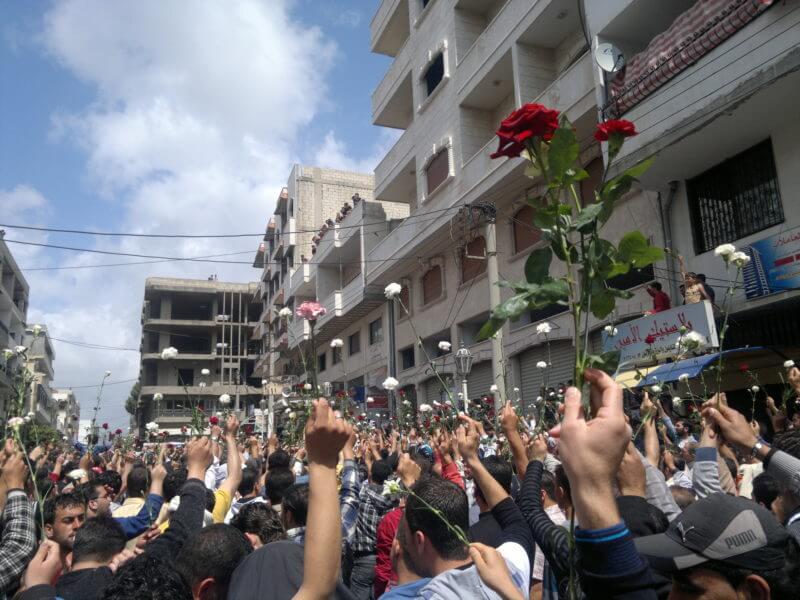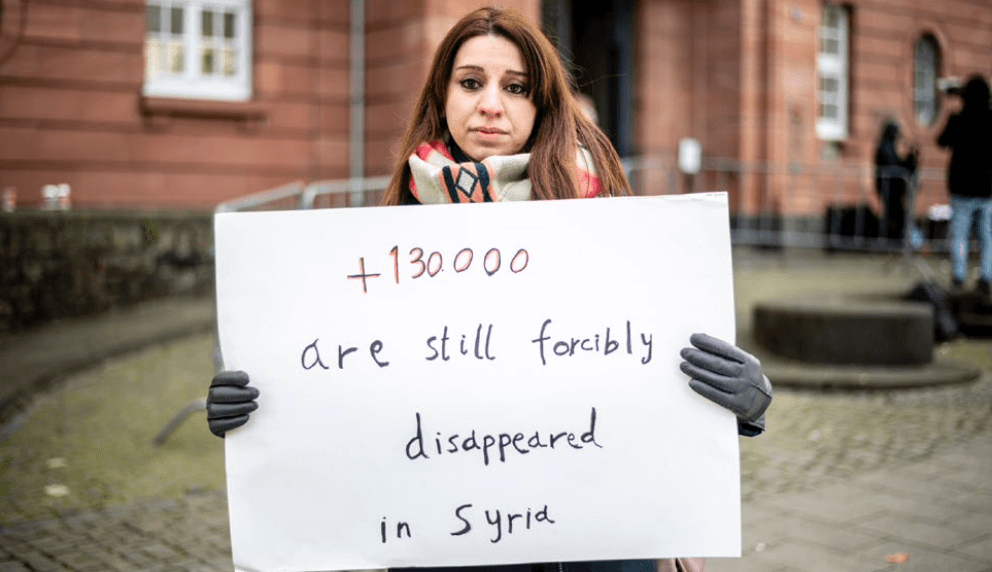NEW YORK (April 26, 2022) — Today, the Human Rights Foundation (HRF) and The Syria Campaign (TSC) published a report, Framing Justice in Syria: The Road Toward Comprehensive Justice, which provides a comprehensive overview of domestic and international judicial avenues to prosecute the crimes against humanity that have been committed in Syria.
The spring of 2022 marks the 11th anniversary of the Syrian revolution. In March 2011, inspired by the Arab Spring protests throughout the Middle East and North Africa, Syrian schoolchildren in southern Daraa painted anti-regime graffiti on a local school’s wall. They were arrested, held for days, and subjected to torture, sparking local protests calling for their release. Peaceful demonstrations quickly expanded throughout Syria, and the Assad regime steadily increased its military crackdown, eventually escalating into a full-fledged armed conflict.

Anti-regime demonstration, protesters holding roses in Baniyas.
Photo credits: Syrian Freedom (CC BY 2.0), May 6, 2011
“Since 2011, the Assad regime has knowingly committed egregious crimes against Syrian civilians that qualify as ‘crimes against humanity,’ including enforced disappearance, torture, murder, imprisonment, and rape,” said HRF Chief Legal Officer Javier El-Hage. “Universal jurisdiction provides a glimmer of hope to the Syrian people — it allows states to prosecute crimes against humanity without the need of showing territorial or nationality ties to the events, the victims, or the perpetrators. Under this principle, domestic courts can ultimately adjudicate the most egregious global crimes offering the opportunity to hold perpetrators accountable and prevent impunity.”
The principle of universal jurisdiction establishes a state’s jurisdiction over gross violations of international law, including crimes against humanity, war crimes, genocide, and torture, even though the crimes occurred outside of its territory and neither the victim nor the offender is a citizen of that state. Germany, for example, has been proactive in pursuing international cases, particularly those involving Syria. Known as the Koblenz Trial, Germany recently convicted Anwar R. and Eyad A., two former officials of Syrian President Bashar al-Assad’s security apparatus, for serious crimes against humanity in Syria.
Despite the historic and groundbreaking nature of the Koblenz Trial, its impact remains limited. Crimes in Syria are ongoing and the Assad regime remains unaffected as it continues on with these crimes. Similarly, universal jurisdiction has failed to redress the suffering inflicted on millions of Syrian victims. Detention survivors, activists, and members of the Syrian diaspora face challenges, including financial hardship, limited access to mental health resources, lack of political or legal support, and, particularly for SGBV survivors, community rejection. Ultimately, universal jurisdiction is only one aspect of justice for Syria.
Human rights advocate Lamis Alkhateeb standing in front of the Koblenz Higher Regional Court on the day of Anwar R.’s verdict. Photo credits: The Syria Campaign/Paul Wagner, January 17, 2022
To inform this report, HRF and TSC conducted interviews with more than a dozen international legal scholars and practitioners, Syrian activists, survivors, and family members of disappeared Syrians, and tech experts, all of whom provided a unique perspective on the extent of the systematic abuse perpetrated by the Syrian regime and the effects this has on building a case for Syrian justice, using the Koblenz trial as a case study on the use of universal jurisdiction.
In this report, HRF and TSC assess the advantages and limitations of universal jurisdiction. They support the targeted use of universal jurisdiction as a means to hold those accused of crimes against humanity in Syria accountable, yet strongly believe that the impunity gap can only be addressed through a comprehensive approach to transitional justice that is conditioned with international political will.
To that end, HRF and TSC offer a series of recommendations and calls to action for the international community and wider public, legal practitioners and policymakers, and global tech, media, and social media companies. These include preserving the narrative and pushing back against propaganda, holding space for SGBV survivors, providing access to mental health services, using sanctions to target abusers while taking all possible measures to minimize the impact on civilians, uncovering the fate of the disappeared, and addressing the role of regional and national powers in the conflict.
Above all else, HRF and TSC recommend a victim-centered approach to justice. Any mechanism of justice or accountability, including universal jurisdiction trials, should respect and include the full participation and input of Syrian survivors and survivor-led groups. Such an adoption supports short and longer-term efforts toward building and framing comprehensive justice for the victims of detention and their families.
The Human Rights Foundation (HRF) is a nonpartisan nonprofit organization that promotes and protects human rights globally, with a focus on closed societies. The Syria Campaign (TSC), launched on the third anniversary of the Syrian uprising in March 2014, is a human rights organization that supports Syria’s heroes in their struggle for freedom, justice and democracy.
For all media inquiries or interview requests, please contact media@hrf.org.

